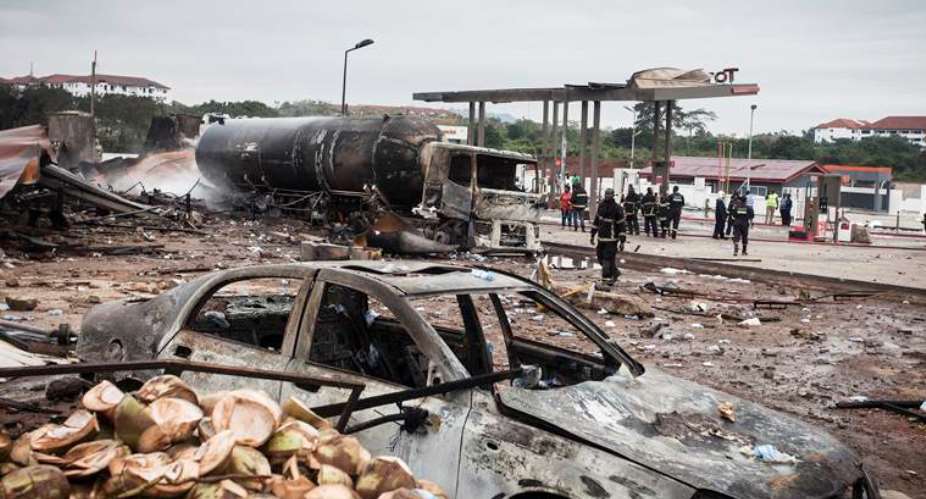The recent atomic junction LPG explosion that rocked North Legon and its environs is the latest testament to the fact that occupational safety and Health is the least thing of concern in this country and hence goes to institutionalize our lack of proper safe systems of work which should be backed by legal frameworks.
Even though there has not been a root cause analysis conducted on this recent catastrophe, a lot of conclusions and assumptions can be inferred owing to the fact that many similar incidents have occurred in like fashion what we witnessed on Saturday the 7th of October 2017.
According to research conducted by A.E.P Brown (2004), fatalities can occur within a 260 meter radius if there is LPG or natural gas infrastructure collapse. The researcher hinted that, secondary effects of exposure could also occur within these distances.
Piper Alpha was a large North Sea oil platform that produced both oil and gas in the 1970’s. On the 6th of July 1988, there was a massive leakage of gas condensate on the platform which was ignited causing an explosion which left 167 people dead.
Lord Cullen was appointed with the responsibility to investigate this incident and proffer recommendations that will shape industry practice for safety within the UK. The committee made 106 recommendations with responsibility for implementation spreading across the regulator for Occupational Health and Safety in the UK (Health and Safety Executive) and the industry players.
Do we as a country have a regulator mandated by law to oversee the general Health and safety implementation strategies of general hazardous industries? What recommendations have been made from previous and similar LPG and other fuel disasters? Do we as a nation have detailed standards with implementation and guidelines? These are just a few questions we need to answer as a country.
Safe to say in recent years, the lack of standardized health and safety practices and regulations in Ghana has been exposed, albeit fatally, through incidents such as the June 3rd disaster, October 7th and various others across the nation.
While admittedly progress is being made, the slow pace of events and lack of rigorous regulations have made the number of people who are harmed at workplaces every year still representing a major challenge.
Preventing workplace injuries is a business imperative in any economic environment. And as a country, we have failed woefully in this regard.
It is ok to say we will pray and intervene for people who are distressed during these times, yes it is good, but the Good old book also says Faith without works is dead. We need as a country need to institutionalize rigorous Hazard Identification, Risk Assessment and Control Techniques. These should be at the heart of all our operations and these must become legal requirements for all organizations irrespective of the nature and scale of operations.
I am very certain in my mind that these factors, coupled with the lack of industry specific safety training, monitoring and auditing of companies involved in High risk activities has been our bane as a people.
Many jurisdictions have adopted the Occupational Health and Safety Assessment Series (OHSAS) 18001 standard as a guideline in institutionalizing occupation health and safety locally. These standards globally have shaped the way organizations deal with hazards, control and improve health and safety performance.
What is the way forward for Ghana now?
Carlos Yaw Akyeampong (Tech IOSH)
Occupational Health and Safety Professional
[email protected]
https://www.linkedin.com/in/carlos-akyeampong-tech-iosh-11078759/
+233 5436696675





 'Kill whoever will rig Ejisu by-election' – Independent Candidate supporters inv...
'Kill whoever will rig Ejisu by-election' – Independent Candidate supporters inv...
 Ashanti Region: ‘Apologize to me for claiming I owe electricity bills else... – ...
Ashanti Region: ‘Apologize to me for claiming I owe electricity bills else... – ...
 Ghana is a mess; citizens will stand for their party even if they’re dying — Kof...
Ghana is a mess; citizens will stand for their party even if they’re dying — Kof...
 Internet shutdown an abuse of human rights — CSOs to gov't
Internet shutdown an abuse of human rights — CSOs to gov't
 Free SHS policy: Eating Tom Brown in the morning, afternoon, evening will be a t...
Free SHS policy: Eating Tom Brown in the morning, afternoon, evening will be a t...
 Dumsor: A British energy expert 'lied' Ghanaians, causing us to abandon energy p...
Dumsor: A British energy expert 'lied' Ghanaians, causing us to abandon energy p...
 What a speech! — Imani Africa boss reacts to Prof. Opoku Agyemang’s presentation
What a speech! — Imani Africa boss reacts to Prof. Opoku Agyemang’s presentation
 Dumsor: Tell us the truth — Atik Mohammed to ECG
Dumsor: Tell us the truth — Atik Mohammed to ECG
 Dumsor: Don't rush to demand timetable; the problem may be temporary — Atik Moha...
Dumsor: Don't rush to demand timetable; the problem may be temporary — Atik Moha...
 Space X Starlink’s satellite broadband approved in Ghana — NCA
Space X Starlink’s satellite broadband approved in Ghana — NCA
